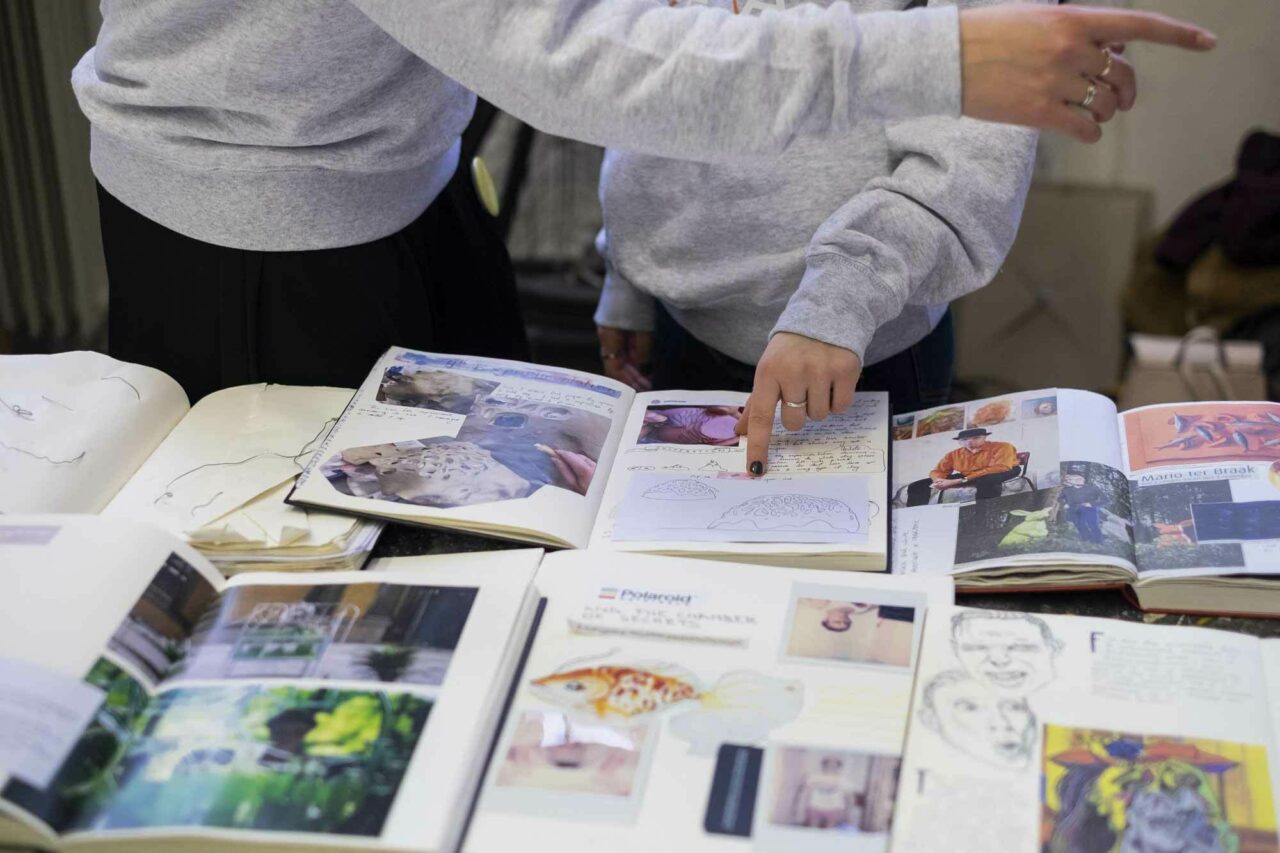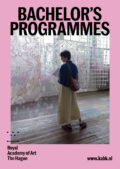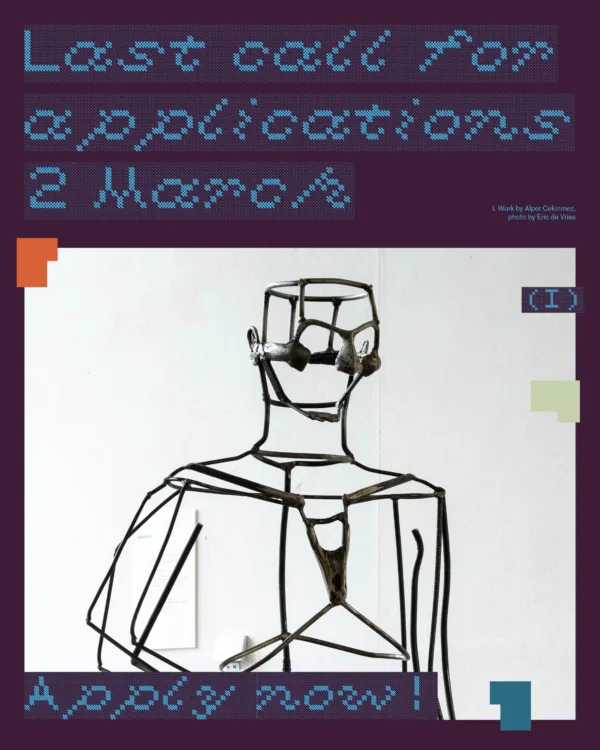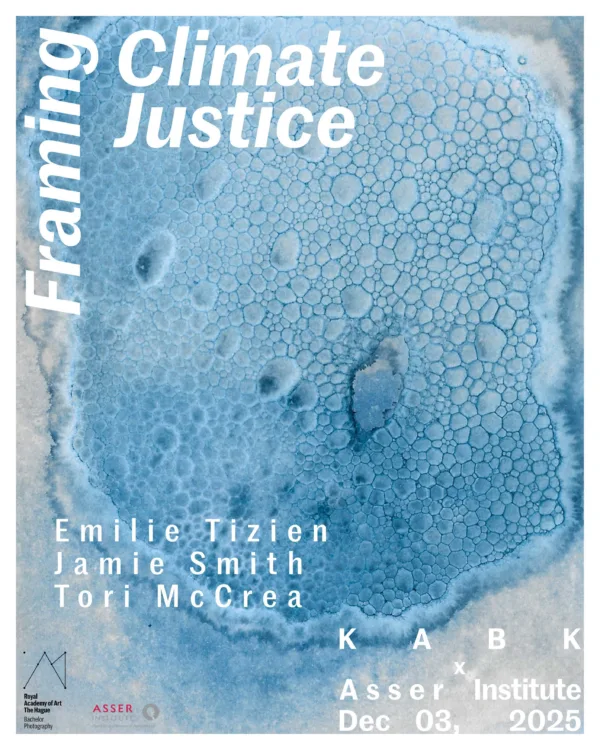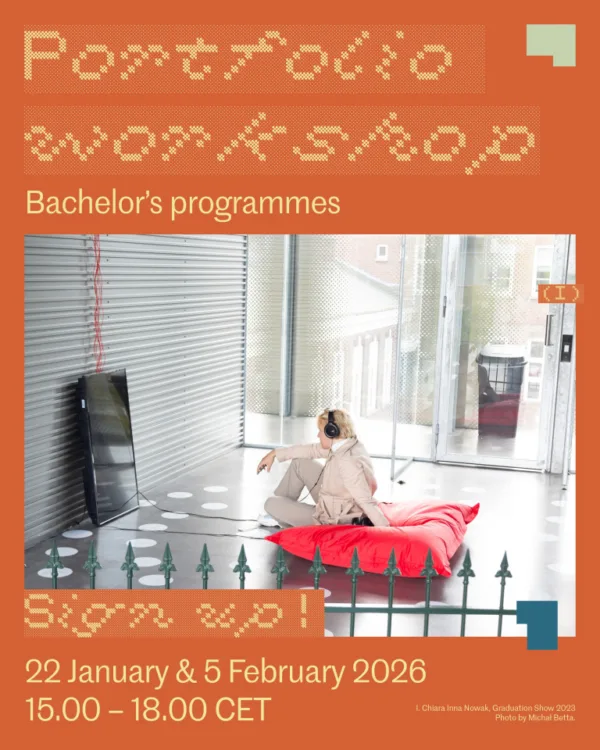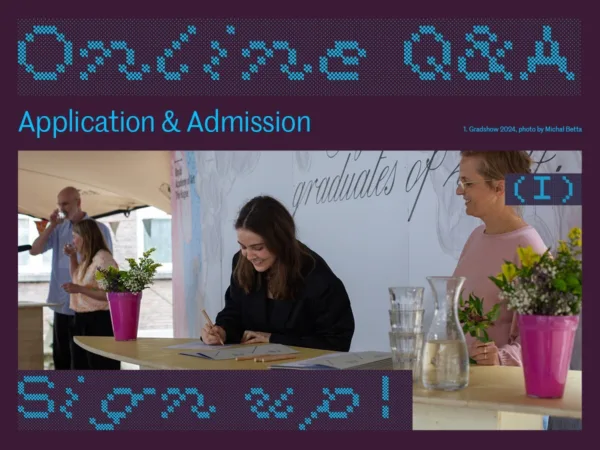Programme description
In the first year, you will work on a variety of short-term assignments where the aim is to provide you with a theoretical and conceptual framework and technical skills to start your positioning within the field of photography.
In the second year, you will further define your position within a wide photographic practice through longer-term projects and a field trip abroad, resulting in forming a collective with your peers.
In the third and fourth years the department will progressively provide you with more freedom to choose the track of your education. Year 3 will be marked by such key events as your collective exhibition outside of the academy’s walls and an internship with an established artist or organisation of your choice.
In Year 4, next to working on your Graduation project, you will find a commissioner to strengthen your collaboration skills and write a Research Paper that will tie-in various facets of your study under a theoretical umbrella.
Programme structure
Each year of the Bachelor Photography programme is divided into two semesters of 16 weeks. Each semester is divided into two blocks of 8 weeks. Courses typically span over one block in Year 1, or a full semester in Years 2-4.
Every semester ends with a Collective Assessment, where you present and reflect on all work from courses over the preceding semester while articulating learning goals for next semester.
ECTS credits
Both the Full-time (FT) and the Part-time Compact (PTC) BA Photography programmes comprise 240 ECTS and last four academic years.
The photography department assessment evaluates integrated competencies. Comprising five domains - research, creation, reflection and positioning, presentation, and professionalisation, assessments examine students' ability to integrate what they learn from different courses into a coherent development of their practice.
These domains are assessed each study year according to the overall goal of that year. In the first year, the focus is on exploration and visual development; in the second year on proficiency and in-depth research; in the third year on professionalisation and presentation; and finally, in the fourth year on profiling and positioning.
Through different courses, there is a progression each study year in each domain, allowing students to acquire new competencies. The courses of the first and second year are more assignment-driven, whereas the third and fourth years are more independently navigated.
Exploration and visual development
The first year of this programme consists of a thorough and intensive introduction to a broad variety of aspects connected with the field of photography. Through theory and practical classes, field trips, exhibitions and events, you will quickly broaden your skills and knowledge of photography and beyond. You learn how to manage your studies and how to structure your work process.
In this first year there is a strong emphasis on improving your technical skills, including postproduction in photography. You are challenged by doing projects in which you take on different practices such as documentary, making portraits, studio practice and more. All these exercises and projects teach you a variety of strategies from which to create work.
In addition, you will follow basic courses in publication design and moving image to gain a better understanding of how contemporary photography is intertwined with other media. By exploring the breadth of the field of photography and visual culture, you will start to discover where your own true interests lie.
Your first semester is concluded with Collective Assessments right before the Winter Break. In the month of January, you will have a wide selection of workshops to broaden your toolbox. The Network Week is part of these workshop weeks.
After another semester of study, at the end of the first year, you should articulate your ideas of your own interests and practice during collective assessment.
| Semester 1 | ECTS FT | ECTS PTC |
|---|---|---|
| Domain: To Research 1 | 5 | 6 |
| Domain: To Create 1 | 5 | 6 |
| Domain: To Reflect and Position 1 | 5 | 6 |
| Domain: To Present 1 | 5 | 6 |
| Domain: To Professionalise 1 | 5 | 6 |
| Common Ground 1 | 3 | - |
| Total ECTS credits | 28 | 30 |
| Semester 2 | ECTS FT | ECTS PTC |
|---|---|---|
| Domain: To Research 2 | 6 | 6 |
| Domain: To Create 2 | 6 | 6 |
| Domain: To Reflect and Position 2 | 6 | 6 |
| Domain: To Present 2 | 6 | 6 |
| Domain: To Professionalise 2 | 5 | 6 |
| Common Ground 2 | 3 | - |
| Total ECTS credits | 32 | 30 |
Proficiency & In-depth Research
In the second year, you start to define your practice in relation to the wider field of photography. This involves dissecting and positioning your interests, research areas and methods as way to find a deepening of articulation of your practice. Reflecting on the practices of your classmates also plays a crucial role in this process. An important goal for the second year is to have your personal vision reflected in your projects. This ambition is supported by courses like Civil Society Lab where you will be encouraged to connect your interests also in a wider societal framework.
As the focus on technique subsides after the second year, this is the last year to bring your technical skills to the highest possible level. You’ll deepen your knowledge and experience of moving image in a course that is tailored to your chosen direction. You also follow a course that entirely focuses on presentation techniques - in line with the ambitions of and intentions of your work.
During the final two weeks of semester 3, you will participate in the Photography Publication Project-Weeks with your photography and graphic design teachers towards a printed publication of your work.
Starting in the second year, the electives program Individual Study Track (IST) provides you with an opportunity to follow courses outside the department or to do projects that complement your personal interests.
One of the highlights of the second year is the international fieldtrip where you produce a body of work on a self-chosen topic within one week. The project is preceded by intensive preparatory research. After the trip, you and your peers collaborate in editing and producing a publication in a one-week workshop.
In January, you will have a wide selection of workshops to broaden your toolbox. The Network Week is part of these workshop weeks.
During the final weeks of semester 4, you will participate in the Constructing Spaces Project, where you will be working with a recently made existing project, translating it into a spatial presentation. Together with your peers you will create group exhibition and start to develop your own space-sense alongside with practicing collaboration.
Both semesters are concluded with Collective Assessments where you articulate your ideas of your own interests and practice.
The final part of the year is spent during the Graduation Support Week, where you work with a graduating student towards their graduation show to give you a glimpse into your own future process.
| Semester 3 | ECTS FT | ECTS PTC |
|---|---|---|
| Domain: To Research 3 | 5 | 6 |
| Domain: To Create 3 | 5 | 6 |
| Domain: To Reflect and Position 3 | 5 | 6 |
| Domain: To Present 3 | 4 | 6 |
| Domain: To Professionalise 3 | 4 | 6 |
| IST 1 | 6 | - |
| Total ECTS credits | 29 | 30 |
| Semester 4 | ECTS FT | ECTS PTC |
|---|---|---|
| Domain: To Research 4 | 5 | 6 |
| Domain: To Create 4 | 5 | 6 |
| Domain: To Reflect and Position 4 | 5 | 6 |
| Domain: To Present 4 | 5 | 6 |
| Domain: To Professionalise 4 | 5 | 6 |
| IST 2 | 6 | - |
| Total ECTS credits | 31 | 30 |
Professionalisation & Presentation
There is a shift after your first two years of study towards becoming more independent in your making, thinking, and relating. This shift is marked by a curriculum that is depending on agency and focus, where you regularly recalibrate your plan for teacher and peer support.
In the third year of your studies, you are challenged to delve deeper by immersing yourself into a semester-long project on a given theme, developed in your course Photography Practice. A driving aspect is to bring nuance and subtlety into both the content and the presentation of your work. You are expected to work with an entrepreneurial spirit, become aware of your potential audience and the consequences this has for your work.
Your semester-long project will be presented in different formats. It will turn into a publication. You are expected to present your project using a different presentation platform, either using Interactive Design (IMD) or Moving Image (MI). You finish the project with a collective public presentation outside the academy where you and your peers will be responsible for and gain valuable experience in organising, producing, publishing, financing, and marketing a project.
Next to the Photography Practice you will attend one Station in semester 5. Stations are short term interventions meant to introduce you to one of the wide practices of photography. It will assist you in consolidating or widening your fields of interests, concerns and methods, that eventually determine your practice.
In the second half of the third year, you do an internship with a professional, based on your learning goals. Over the course of 16 weeks, you will build up a network and obtain experience in the professional field. This experience enables you to connect different elements of your study and helps you to make plans for your final year. During the last month of your internship, you will follow meet-ups with peers and teachers to provide you a start in the run-up to the courses of the fourth year. Instead of an internship, or next to an internship, you can also choose to spend a semester as an exchange student at one of our partner institutions abroad.
The Individual Study Track (IST) provides you with the opportunity to follow courses outside our department or create projects that complement your personal interests.
| Semester 5 | ECTS FT | ECTS PTC |
|---|---|---|
| Domain: To Research 5 | 5 | 6 |
| Domain: To Create 5 | 5 | 6 |
| Domain: To Reflect and Position 5 | 5 | 6 |
| Domain: To Present 5 | 5 | 6 |
| Domain: To Professionalise 5 | 6 | 6 |
| IST 3 | 6 | - |
| Total ECTS credits | 32 | 30 |
| Semester 6 | ECTS FT | ECTS PTC |
|---|---|---|
| Domain: To Research 6 | 4 | 6 |
| Domain: To Create 6 | 4 | 6 |
| Domain: To Reflect and Position 6 | 5 | 6 |
| Domain: To Present 6 | 5 | 6 |
| Domain: To Professionalise 6 | 4 | 6 |
| IST 4 | 6 | - |
| Total ECTS credits | 28 | 30 |
Profiling & Positioning
There is a shift in the last two years of study towards becoming more independent in your making, thinking and relating. This shift is marked by a curriculum that depends on your agency and focus, where you regularly recalibrate your plan for teacher and peer support.
In the fourth year, you focus on three major components: commissioned work, research paper and your graduation work. The three components inform each other: the so-called ‘triangle’. Together they determine and offer insights into your practice. An important challenge is to better articulate who you are as a maker, to describe your process, progress and practice, concerns that you want to respond to and where you stand in the professional field.
Your commissioned work will be realised for a commissioning partner (or client) from outside the academy and should fit within your own field of interest. You will improve several critical skills, such as your ability to be pro-active, to manage responsibilities and your ability to collaborate. The result should be published in an existing (online) magazine, exhibited in a real exhibition space, or take on any other form as desired by both you and the commissioning partner, that reaches an audience.
At the same time, you also work on your research paper: conducting research and writing about a self-chosen topic that informs your practice and the links to your graduation and commissioned work (triangle). The research paper helps you to better understand your position as a maker and can be seen as the backbone of your graduation work.
Your graduation project defines you as a photographer and will be your entry to the professional field of art and photography. You develop a personal working method that enables you to continue your development as a critical maker and thinker after your graduation.
Next to commissioned work, graduation work and research paper, you will select to attend one station. These stations are short term interventions meant to further introduce and/or deepen your understanding of the wide practices of photography. It will assist you in consolidating or widening your fields of interests, concerns and methods that eventually determine your practice.
In addition to the three major components, extra attention is paid to organisational and entrepreneurial skills, such as setting up a business, developing and pitching a project, branding and networking, grant applications and other aspects that prepare you for a professional practice after graduation.
In January, you will participate in the Photography Eco-Systems, a series of presentations, discussions, workshops, portfolio reviews, and roundtables to bring a closer awareness of ethical, industry, environmental elements that you need to consider in your future practice as a photographer and meaning maker.
The Individual Study Track (IST) provides you with the opportunity to follow courses also outside our department or create projects that complement your personal interests. During the last semester, you can work on the publicity campaign and catalogue for your graduation year.
At your final exam, you will show a coherent visual presentation (physical and digital) of your commissioned work, research paper and graduation work. Additionally, you’ll deliver a presentation that elucidates your work and intended place in the professional field. Once you pass your exam, your work is exhibited during the Graduation Show.
| Semester 7 | ECTS ft | ECTS pt |
|---|---|---|
| Domain: To Research 7 | 5 | 6 |
| Domain: To Create 7 | 4 | 6 |
| Domain: To Reflect and Position 7 | 5 | 6 |
| Domain: To Present 7 | 5 | 6 |
| Domain: To Professionalise 7 | 5 | 6 |
| IST 5 | 6 | - |
| Total ECTS credits | 30 | 30 |
| Semester 8 | ECTS ft | ECTS pt |
|---|---|---|
| Domain: To Research 8 | 6 | 6 |
| Domain: To Create 8 | 6 | 6 |
| Domain: To Reflect and Position 8 | 6 | 6 |
| Domain: To Present 8 | 6 | 6 |
| Domain: To Professionalise 8 | 6 | 6 |
| Total ECTS credits | 30 | 30 |
OER 2025-2026
Education and Examination Regulations
You can find information about the regulations and provisions dealing with the organisation of the programme and the assessments and examinations related to it in the Education and Examination Regulations (in Dutch: Onderwijs- en examenregeling; OER)

